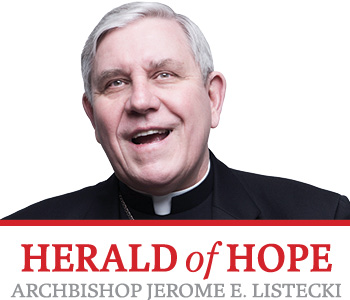Herald of Hope
This is the season of Lent. It is an opportunity to deepen our relationship with Jesus. Although it is a reminder of our mortality — the fact that we are dust and to dust we shall return — it is also a reminder that we belong to God and his Son, who sacrificed himself for our salvation out of love. We began this Lenten journey by accepting the ashes, a sign of our willingness to repent, to examine our lives and to establish those priorities that bring life. Many marked by the sign of the cross displayed them on their foreheads. They were responsible to account for those smudges of dirt on their foreheads to their coworkers and associates. In our modern world, our lives are surrounded by ideologies and popular trends; the sign of the cross marks us for something different. The sign of the cross presents us as intentional believers committed to Christ. But external trappings alone will not suffice. We must internalize the outward and grow in our understanding of what we are called to do as instruments of Christ in our world.
For many decades, we were considered a Christian culture. Signs and symbols that surrounded us reflected a Christian environment. If you were in a Catholic hospital in the 1950s or 1960s, you would see religious or priests roaming the halls. It was common to see visits from religious who prayed with patients, crucifixes and religious pictures of saints adorned the rooms, and Mass was a daily occurrence. Today, it is often difficult to differentiate a Catholic hospital from a secular hospital. The environments are so similar. Many of our Catholic schools and charitable institutions also fall into the secular mode of expressions. There are often depictions of beautiful natural landscapes or historic civic moments which replace the religious signs and symbols. I have often felt that many who have attempted to create neutral environments have done so at the expense of our Catholic identity. Many believe that a neutral environment creates a more welcoming experience and is less threatening to those they serve. There is a respect for others, while not diminishing the reason for their own existence, which is formed in the belief and adherence to Christ and the cross.
The missionaries traveled to the ends of the earth not to celebrate that we are all “nice” people, but rather because they needed to proclaim the Gospel and to convert individuals to Christ Jesus. There was an urgency for the missionary to use the time afforded to bring people to the Lord. We have lost that drive for conversions. Do we still worry about the souls of our people? We encounter those in our own society that may hate Christianity because it stands in the way of what they believe to be social progress, but the greater danger can be seen in those who totally dismiss Christianity and its teaching for having no relevance in this modern world. Have we lost our messaging? Why would Christ mandate the Apostles to go preach, teach and baptize in the name of the Father, the Son and the Holy Spirit, if he didn’t mean it?
Christianity teaches an objective truth. Today’s ideologies reject objective truth and dwell in the idea of a relativism that is so particular that one must affirm another individual’s judgment, even if it is outrageously wrong and under that approach there is no such thing as sin. It may be wrong for you, but it is right for me. If no one sins, why do we have need for a redeemer? There is no need for salvation if we do not need to be saved. Is there anything which is always wrong? Of course, there is, and relativizing the truth does not dismiss the wrong.
Being intentional in this period of our existence is extremely important. It is the means of our re-evangelization: accepting God on God’s terms rather than on our terms. We need witnesses to the faith. This will not be easy. It means that we must be counter-cultural. The Church’s teachings reflect God’s direction for us in this world. This may mean we must stand against even our family members for the sake of the truth. In Luke 14:26, the cost of discipleship is that our loyalty to Jesus outweighs even our loyalty to family. “If anyone comes to me without hating his father, and mother, wife and children, brothers and sisters, and even his own life, he cannot be my disciple.” But we always do so out of love and concern for their souls. This is a stark reminder of the centrality of our relationship with Christ for our salvation and the salvation of those we love.
This last weekend, I received the elect and candidates from a number of our parishes. These are individuals who will be baptized into Church at Easter and those who are already baptized, and will now seek to participate in the fullness of the sacraments. The elect and candidates who were presented at the ceremony possessed a multitude of stories of having been called by the Holy Spirit to embrace the Roman Catholic Church. The Catholic Church offers to them a way for their salvation. They will face the temptations presented to them by the world to reject the importance of the spiritual life in favor of material well-being. But one can never be happy apart from God, who must be our priority. The world needs intentional disciples of Jesus. I am confident that a number of those who were present in the congregation will grow in holiness and embrace the Church’s teachings.
A small band of disciples of Christ changed the world. It is now our responsibility to take up the cross and follow him.

